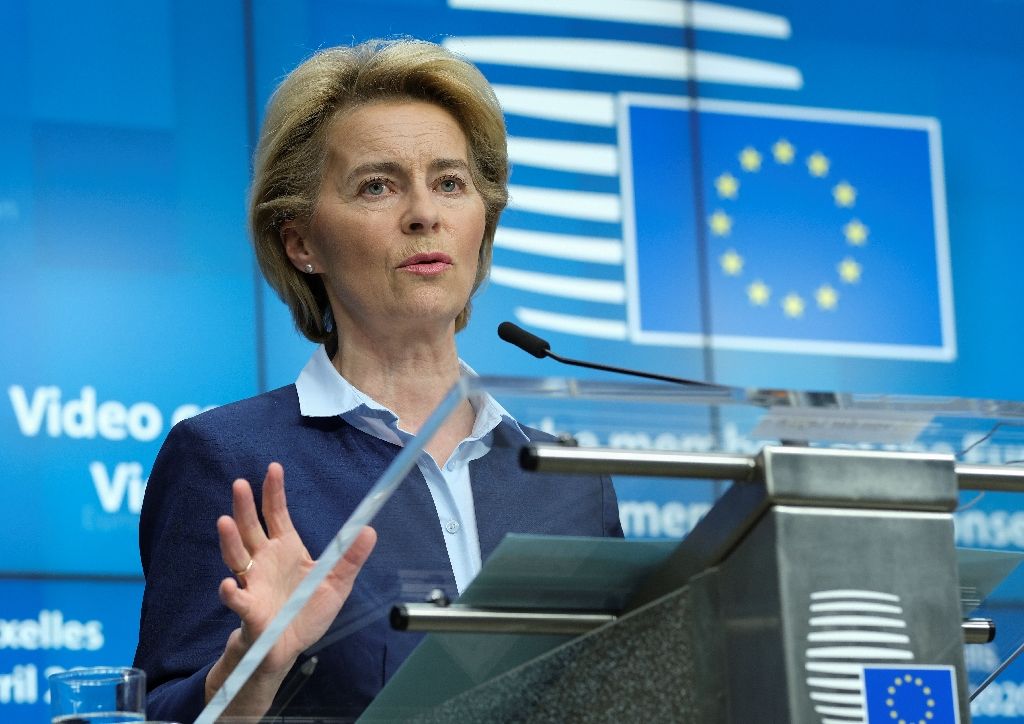EU’s Von der Leyen to unveil trillion-euro recovery plan
()
(AFP)
European Union chief Ursula von der Leyen will on Wednesday propose a roughly one-trillion-euro post-virus recovery fund for Europe, but will have to win over sceptical member states.
The global coronavirus outbreak has thrust the EU into its deepest ever recession, and Von der Leyen’s proposal will set out to help the worst affected countries.
The virus has killed at least 172,000 people in Europe and put its economy in a deep freeze, with businesses only slowly reopening and tight controls on borders that were once wide open for travel and trade.
Italy and Spain were Europe’s first victims of the outbreak and, still burdened with heavy debts, lack the firepower of Germany and others to rebuild their shattered economies.
The European Commission, the EU’s executive arm, has won the crucial backing of Germany and France to raise 500 billion euros ($550 billion) on financial markets to begin to fix the problem.
German Chancellor Angela Merkel dropped a bombshell last week by approving an idea that partly reverses Berlin’s staunch opposition to joint borrowing by EU members.
Merkel, who is in the final years of a long stint as German chancellor, also backs the EU helping virus-struck countries with grants rather than loans, another policy U-turn by Berlin.
But the French-German plan faces a counter-proposal from the so-called Frugal Four: northern EU member states who have traditionally opposed giving more cash to Brussels or transferring it to the indebted south.
They firmly oppose paying out aid in grants, preferring loans that come with stern conditions and outside oversight, and reduce risk to their own taxpayers.
They also accuse southern Europeans of living beyond their means and piling on debt instead of choosing fiscal reform.
– ‘Strong infighting’ –
The grants versus loans debate is no small matter, with Italy, Greece and Spain already crippled by mountains of debt, despite embarking on painful reforms since the 2008 financial crisis.
European Central Bank Vice-President Luis de Guindos on Tuesday warned that more debts incurred by countries already under pressure could spook the markets and endanger the euro single currency.
The European Central Bank (ECB) strongly backs joint borrowing by the EU to check that threat.
Janis Emmanouilidis, of the Brussels-based think tank European Policy Center, said the French-German proposal, “makes it difficult for others to resist compromise.”
Still, given the frugals’ approach, “you just know how far away we’re still from an EU-27 compromise …. strong infighting is ahead,” he said.
A top EU official said that Von der Leyen’s compromise would propose about one trillion euros through a mix of grants and loans.
Von der Leyen will first deliver the plan to the European Parliament before hosting a news conference and then devote the next weeks and months to tough negotiations with EU nations and MEPs.
Diplomats predict talks could drag on until at least July, while experts do not expect an agreement before September — when Germany has taken over the rotating EU presidency.
Financing the plan could take even longer as it would require ratification by national parliaments across all EU member states — typically a risky process.
Von der Leyen’s commission has already delivered more modest recovery aid, including insurance for strained partial employment schemes as well as suspending rules on running up national deficits
The 19 countries that use the euro single currency have already made available 540 billion euros in loan guarantees for emergency health spending.
Disclaimer: Validity of the above story is for 7 Days from original date of publishing. Source: AFP.


